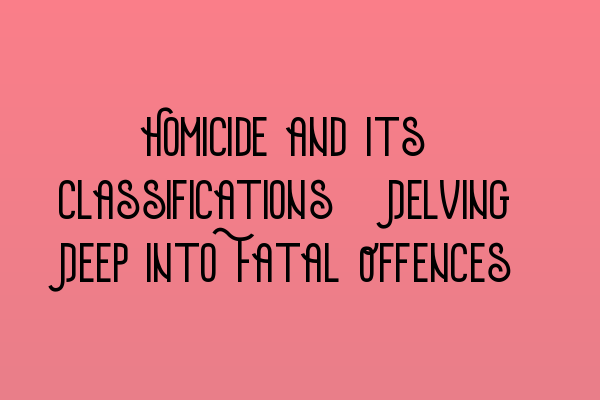Homicide and Its Classifications: Delving Deep into Fatal Offences
In the field of criminal law, one of the most serious and complex offenses is homicide. Homicide refers to the unlawful killing of another person, and its various classifications shed light on the different degrees of culpability and severity in fatal offenses.
Murder
Murder is the most severe form of homicide and involves the intentional and premeditated killing of another person. It is a deliberate act with the intent to cause death. Unlike manslaughter, murder requires the presence of malice aforethought.
There are two degrees of murder: first-degree murder and second-degree murder. The classification of murder into degrees helps distinguish between planned and premeditated killings and those that occur impulsively or without premeditation.
First-degree murder involves a deliberate and premeditated killing with malice aforethought. It may also include felony murder, which occurs when a death results during the commission of a dangerous felony, such as robbery or burglary.
On the other hand, second-degree murder refers to an intentional killing without premeditation or malice aforethought. It is often characterized by a heated argument or sudden provocation leading to the fatal act.
Manslaughter
Manslaughter is a less severe form of homicide and is typically the result of a reckless or negligent act. Unlike murder, manslaughter does not involve malice aforethought. It can be further divided into voluntary manslaughter and involuntary manslaughter.
Voluntary manslaughter occurs when an individual intentionally causes the death of another person under circumstances that may mitigate the culpability. These circumstances may include acting in the heat of passion provoked by adequate provocation or experiencing diminished mental capacity.
Involuntary manslaughter, on the other hand, refers to unintentional killings that result from reckless conduct or criminal negligence. It may occur due to the failure to perform a legal duty, such as a negligent act while driving a vehicle leading to the death of another person.
Infanticide
Infanticide is a specific form of homicide involving the killing of a newly born child by their mother. It is important to note that infanticide carries different legal implications compared to other forms of homicide. The law recognizes that the mother may be suffering from postpartum depression or other mental disorders at the time of the offense, which may mitigate her culpability.
It is essential for legal professionals specializing in criminal law to have a thorough understanding of the classifications and legal implications of various forms of homicide. This knowledge enables them to provide effective legal representation and ensure the fair administration of justice.
If you are interested in further preparing for the SQE exams or enhancing your legal knowledge, check out these related articles:
- SQE 1 Practice Exam Questions
- SQE 1 Practice Mocks FLK1 FLK2
- SQE 2 Preparation Courses
- SQE 1 Preparation Courses
- SRA SQE Exam Dates
By exploring these resources, you can gain valuable insights into the SQE exams and find comprehensive preparation courses to improve your chances of success. Remember, staying updated and well-prepared is crucial for excelling in the field of criminal law.
